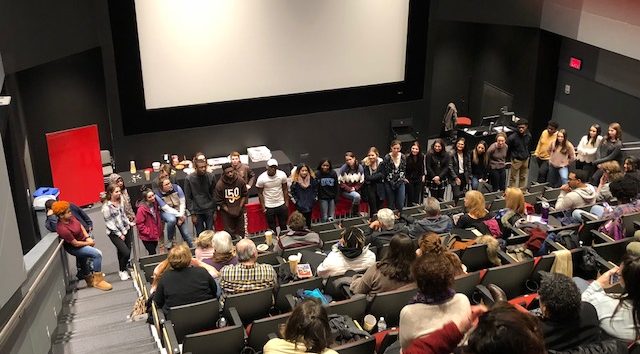
I’ve been meaning to blog about a documentary called Weiner(2016) directed by Josh Kriegman and Elyse Steinberg. After I heard Kirsten’s story and takeaway from the documentary, I was motivated to write about it. The two directors of Weiner were just there to film Anthony Weiner’s comeback campaign. For those of you who don’t know, because I didn’t until watching this, Anthony Weiner is an American former congressman who represented New York and was forced to resign after pleading guilty for his sex scandal. Back to the two documentarians who were just flies on the wall during Weiner’s campaign. There was a lot of excitement and we could see all the Democrats of the city support Weiner. As an audience, we are also introduced to Huma Abedin, Hillary Clinton’s right hand and also Weiner’s unbelievably intelligent wife. We notice how he uses his wife as a middleman for all her contacts since he needs funding during the campaign. We watch her quietly help him and stand by his side. BOOM. Sex scandal. Nude pictures that are sent from Weiner’s phone to a random woman are leaked in the media. Everyone is disgusted and there is tension all over. He keeps fighting back and asking for an apology, insisting that we are all human and make naive mistakes. Huma still stays with him and his campaign is relaunched.
Throughout the documentary, the story goes deeper and deeper. From being the lead in the election, Weiner becomes a toxic name in New York City. His personal life is an open journal for everyone, especially after the scandal surfaced. We gradually start noticing how silenced Huma is and how she is this one character who is coping and suffering the most from her husband’s actions. She is portrayed and probably was in an emotionally imprisoning relationship. The documentarians are shredding his story as the topic gets more complex. Who would’ve ever known that all this would happen going into this project? Kirsten mentioned that one of the documentarians was his Chief in staff. Professor Sikand immediately responded that she’d never be able to betray or portray her subject in such a way after they have given her permission to be a fly in the wall during such a critical point in their lives. Kirsten said that when you’re filming a documentary, you can initially be looking for x, but then you arrive at Z. She relates it to her and Laura Poitras’s experience with Julian Assange during the filming of Risk(2016). Relating to Weiner, the documentarians started off with the campaign, which lead to the reveal of the sex scandal, which transformed the story. Towards the end, the focus completely shifts towards how much Huma was suffering.
Kirsten’s takeaway was that the people directing need to have a certain persona to make the film they have. She mentioned that one of the directors, Josh Kriegman’s dad was in a cult with all of his sons. Josh was one of the sons who wasn’t part of this cult. He didn’t believe and see what they did. He turned against them. I don’t know more specifics to this story but the point is that the director also brings an attitude to the table. After watching Weiner, you can tell that the documentarians were relentless. I’m not one who is randomly interested in politics or congressmen, but this documentary is definitely worth a watch!
Link to trailer : https://youtu.be/LCoI3DdstZw

It is sort of exciting and anticipatory that the story you are after can turn into something completely unexpected. At the same time, it becomes a challenge and you are thrown off course and onto something new. This could be disorienting. Now that your old plan is no longer in synch with what seems more important, how do you reorient to something more interesting, but less predictable? The planning that went into the original idea for the documentary is almost useless because a shiny toy wrench has been thrown in to the mix. Can you even create a plan of attack for the ‘new’ story, or are you forced to blindly follow the story, taking perhaps months or years longer than you planned on working on the original project? I suppose research along the way would be vital, but how do you know when it stops? Do you just know?